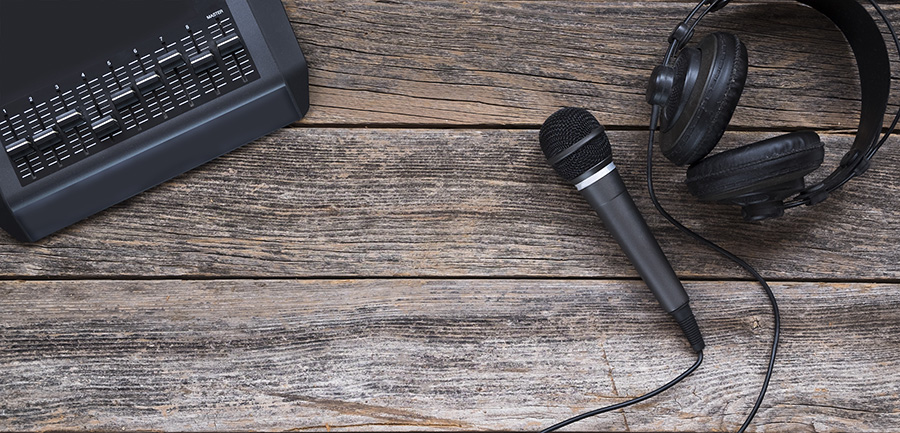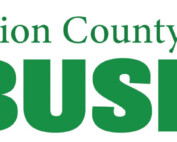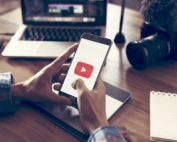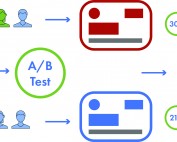Podcasting is to radio what YouTube is to television. As new digital platforms allow average users to build large audiences as content creators, traditional media outlets are becoming less of the message gatekeepers they once were. The best part? You can learn how to start a podcast and put it to action quickly.
Whether it’s business, politics, sports, entertainment, or anything else in between, brands and fans alike are starting podcasts to join conversations and position themselves as thought leaders within specific industries. A popular example of a branded podcast is ZipRecruiter’s Rise and Grind Podcast hosted by Daymond John of Shark Tank fame. Here, ZipRecruiter enjoys plenty of ad time while listeners tune in to hear John’s take on relevant business topics. The content does not appear blatantly promotional for ZipRecruiter in a negative way because the audience knows that this is a branded production before they ever hit the play button thanks to the “Presented by ZipRecruiter” tagline in the title.
Major media companies are also starting to recognize the podcast space as a prominent way to reach new audiences. For example, 31 Thoughts: The Podcast is a weekly hockey commentary series from Sportsnet – one of Canada’s two largest sports content networks. The podcast is hosted by highly respected National Hockey League insiders Jeff Marek and Elliotte Friedman; offering their perspectives on the state of affairs in professional and amateur hockey. Fans of the sport are drawn to the podcast that features trusted personas, and Rogers (Sportsnet’s parent company) appreciates the advertising revenue they can generate from this media venture that nearly guarantees an engaged, built-in audience.
However, podcasting does not require a complex setup or the financial backing of a high-profile telecommunications corporation. Are you a fan of a particular TV series? Grab a microphone, use a basic recording software, and you can start your own amateur podcast right in your home! The best aspect of podcasting is that anyone can have the opportunity to create a successful series of their own.
Want to start a podcast for your business or for yourself? Read the following tips to create a robust production strategy that will help you generate the results you’re looking for:
Start a Podcast by Creating an Editorial Calendar
Before you speak a word into your microphone, you need to create an editorial calendar to help you decide when you will release your episodes and what topics you will be discussing. Having a calendar in place will keep you focused and on-schedule.
The editorial calendar will determine the logistics of your strategy. For example, before you start your podcast, you should determine whether you want to release new episodes on a weekly, bi-weekly, or monthly basis. Planning episode topics far in advance will also give you more time to prepare more detailed notes and talking points as well as secure any guests you may want to feature on your show.
Determine the Best Space for Recording
Determining the best acoustic environment for recording your podcast episodes is essential. For example, if you are recording in a large room with high ceilings, your voice will constantly echo and you will sound far away from your microphone. Similarly, if you are recording in a room where there are multiple people present, you may find your voice drowned out by the activity of others.
If you do not want to build a soundproof recording studio, the next-best option would be to find a quiet, private office space that is far away from outside noise. In this setting, you can talk more comfortably without worrying about others listening in and there is less of a threat that loud noises will interrupt the production process.
Select the Right Equipment
How do you plan to record your podcast? There are a variety of recording methods to choose from. Some may choose to buy a studio-quality microphone and use a sophisticated mixing software. Those that desire a simpler and more affordable option may opt to plug a USB microphone into their computer or use their smartphone.
Selecting the right equipment that meets your production demands is key. If you plan to interview guests over the phone, you may want to invest in some type of microphone to record the phone call over the computer. If you plan to only host in-person discussions or to give monologues, you may be able to record the majority of your content with your phone. Your editorial calendar can help provide you with advance insight on what equipment you will need to record each individual episode of your podcast.
Distribute Accordingly
Listeners access their favorite podcasts through many different platforms such as Apple Podcasts, Soundcloud, Spotify, Stitcher, and Google Play. Some podcasters also choose to upload video recordings of their episodes onto video hosting sites like YouTube as well.
Before recording your first podcast episode, research where other similar or competing podcasts are distributing their content. This will help you provide insight on which channels you should pursue.
Start Podcasting Today!
Looking to start a podcast for your business? Contact us and we would be happy to consult with you on creating the best strategy possible.









